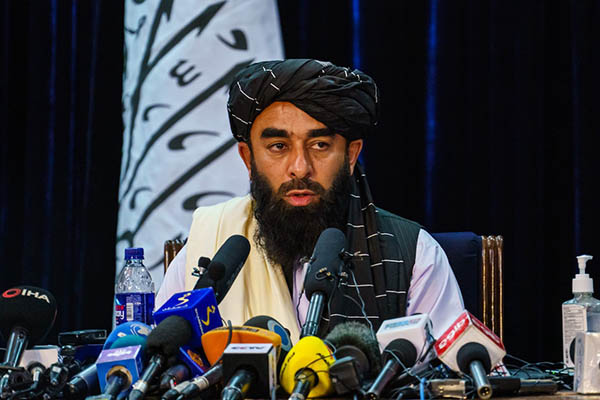
Zabihullah Mujahid addresses a press conference in Kabul
In first press conference since taking back control of Afghanistan, insurgents seek to project ‘moderate’ image to global community
The Afghan Taliban on Tuesday addressed their first press conference since taking control of Kabul a day earlier, vowing to respect women’s rights “in accordance with shariah law,” grant amnesty to all who had resisted them, and ensure a secure and stable Afghanistan.
Speaking to local and international media, spokesman Zabihullah Mujahid sought to project a “moderate” image of the Taliban, stressing that they would not allow their soil to be used against any other country and would be amenable to “allowing” women to work and continue their education. Reactions to the press conference have been mixed, with some praising the “professionalism” on display, while many others expressing skepticism that the insurgents’ statements are an accurate reflection of ground realities.
“We want to do away with the factors for conflict. Therefore, the Islamic Emirate does not have any kind of any kind of hostility or animosity towards anybody,” he said, as an interpreter provided an English translation. “We would like to live peacefully. We do not want any internal enemies or external enemies,” he said, stressing all animosity “has come to an end.”
Mujahid claimed that the Taliban would not seek any vengeance against former soldiers of the Afghan National Army or members of the Western-backed government, reiterating a general amnesty for all former opponents of the insurgents, including contractors and translators who worked for international forces. “War has ended … [Taliban] has pardoned everyone,” he said.
The spokesman said he wanted to assure all Afghans that the Taliban would form a “strong, Islamic, and inclusive government” after consultations. He also claimed that the only reason the Taliban had entered Kabul was because former president Ashraf Ghani’s resignation and flight from the city had provoked a security crisis that had required them to step in.
“Our plan was to stop at the gates of Kabul after capturing all other provinces,” he claimed, assuring the residents of Kabul of “their full security, of protection of their dignity and security and safety.” He also claimed that the security of embassies was of “crucial importance” to the Taliban and sought to assure foreign countries and aid organizations their presence would have “complete security.”
The Taliban “do not wish to see any kind of chaos” in Kabul, he added.
The spokesman said the Taliban wanted the international community to treat them as per international norms accorded to all countries. “We do not wish to have any problem with the international community. We only wish to act on the basis of the principles of our religion, our culture,” he said, acknowledging that women’s rights was a “very important issue.”
“The Islamic Emirate is committed to the rights of women within the framework of the sharia. Our sisters, our women will have the same rights, and will be able to benefit from them,” he claimed, stressing this would be on the basis of “rules and regulations” in “education, health and other areas.”
Women would “work with us shoulder-to-shoulder,” he said, claiming there would be no discrimination against women.
The briefing also discussed the Taliban’s plans for Afghanistan’s economy, with Mujahid saying an infrastructure would be developed as soon as the conflict was fully resolved. Referring to the country’s natural resources, he said they would be used to “revitalize the economy” for the country’s reconstruction and for prosperity. “The whole [Afghan] community will be active in trade, in economics,” he said, adding that the Taliban are “committed to build our society.”
Describing the group as the “servants of the nation,” the spokesman also pledged to rid Afghanistan of narcotics and urged the international community to help it develop alternative crops for farmers who have relied on opium poppies for their livelihood.
On freedom of expression and a free media, Mujahid said private media could continue to operate independently so long as they did not violate Islamic principles. “Islam is a very important value in our country. Nothing should be against Islamic values when it comes to the activities of the media,” he said. “They can critique our work so we can improve,” he added.
Later on Tuesday evening, Taliban’s deputy leader Mullah Baradar arrived in Kandahar from Qatar where he has spent months leading talks with the U.S. and Afghan peace negotiators.
Also on Tuesday, Pakistani Prime Minister Imran Khan met a delegation of Afghan political leaders in Islamabad and urged them to work together to lead Afghanistan toward a path of sustainable peace and stability. “No other country is more desirous of peace and stability in Afghanistan than Pakistan,” he told the delegation, according to a statement issued by the Prime Minister’s Office.
The statement emphasized that Pakistan had made it clear that while it welcomes the “peaceful” transfer of power in Afghanistan, it would not take any unilateral decision to recognize a Taliban government. It also noted that Khan had highlighted the importance of all sides working to secure an inclusive political solution.
